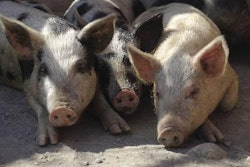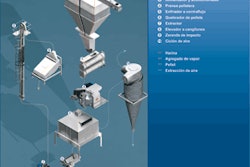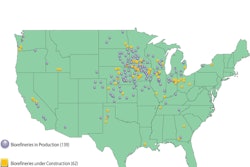
The big victory for egg producers and others in animal agriculture the bill has none of the animal welfare regulations that activist groups had been pushing.
Another plus: the final conference committee deleted language from the Senate bill that might have complicated grower-processor contract relationships.
The egg industry doesn't normally play a big role in farm bills, which focus mostly on crop support programs, but legislative maneuvering for the past year presented issues that demanded attention.
The first took the form of efforts launched in May 2007 by the Humane Society of the United States (HSUS) to persuade the House Agriculture Committee to include a separate animal welfare title in the farm bill.
HSUS President Wayne Pacelle hoped that it would require USDA and military food purchasing programs to buy only cage-free eggs and meat and milk from farms that followed procedures that his group classifies as "humane" including bans on forced molting and crates for veal calves and pregnant sows.
Pacelle's ideas never got any serious consideration in the agriculture committees and no serious attempt was made to add them when the bill was on the floor.
"Other than some minor laboratory animal provisions, there is no animal welfare' title, nothing that would outlaw modern, scientific production methods," says Howard Magwire, Washington representative of United Egg Producers (UEP). "We never saw any proposal float to the top, although we had heard rumors of some."
Grower contract protection'
He also was relieved that conferees dropped several features of the Senate-passed bill that would have further regulated contracts between livestock and poultry growers and processors.
"We considered that a win," he said.
Although the contract provisions were directed mostly at pork and broilers, "they might have inadvertently brought a portion of our industry under the Packers and Stockyards Act. It would have had a negative effect on relationships with contract producers."
Although egg producers have not faced the same kind of controversies that sometimes arise with broiler production, "our feeling is that it would create an extra burden on these relationships. This was a win for the small guys and our processors."
The final version dropped several provisions opposed by poultry companies to regulate production contracts. But it included one that allows associations of poultry growers to negotiate on behalf of their members and one that would allow contract growers to cancel a contract up to three business days after the contract is signed.
A grow-out contract that contains a provision requiring the use of arbitration will have to "conspicuously disclose the right of the contract producer or grower, prior to entering the contract, to decline the requirement to use arbitration to resolve any controversy that may arise under the livestock or poultry contract." However, growers and companies would have the right to seek arbitration after a controversy arises if both consent to it in writing.
Feed costs and ethanol
UEP would have preferred that the bill offer some relief from high feed costs but considered small victories a slight reduction in the tax subsidy to ethanol blenders and a promise of investment in cellulosic ethanol to relieve the pressure on corn prices.
"The thing that is hurting us is not the farm bill but the energy bill last year that stepped up the mandate for corn-based ethanol," he said.
Magwire expressed regret that conferees dropped a Senate provision that would have granted specific protection of the confidentiality of information collected by USDA's National Animal Identification System. He said the industry would continue to rely on USDA's promises to prevent disclosure of the information, which might be used by animal rights activists to target poultry and livestock operations. "We did encourage the provision that would legislatively say the information is protected" and thus not vulnerable to a challenge in court, he said.
Poultry meat provisions
The bill also will require retail packages of poultry, red meat and several other food products to disclose their country of origin. It will take effect after USDA publishes the regulation to implement it, likely later this year.
It also would allow, for the first time, interstate sale of poultry meat from a plant that is inspected by a state government rather than USDA's Food Safety and Inspection Service.
The compromise bill also creates a reporting requirement for a plant to notify USDA if it determines that adulterated or misbranded poultry meat entered the stream of commerce and was "reasonably likely to cause serious adverse health events or death."
The language requires USDA-inspected poultry plants to prepare and maintain, in writing, a recall plan and any reassessments of their hazard analysis and critical control point plans and to have those plans and reassessments available to USDA inspectors.
The bill provides that USDA compensate growers, processors and state agencies the full cost of disease control and eradication measures. It was designed to ensure compensation for any owner or contract grower of poultry participating in the voluntary control program for low pathogenic avian influenza (AI) and payments to state agencies to cover their costs of AI control or eradication.





.jpg?auto=format%2Ccompress&fit=crop&h=167&q=70&w=250)











